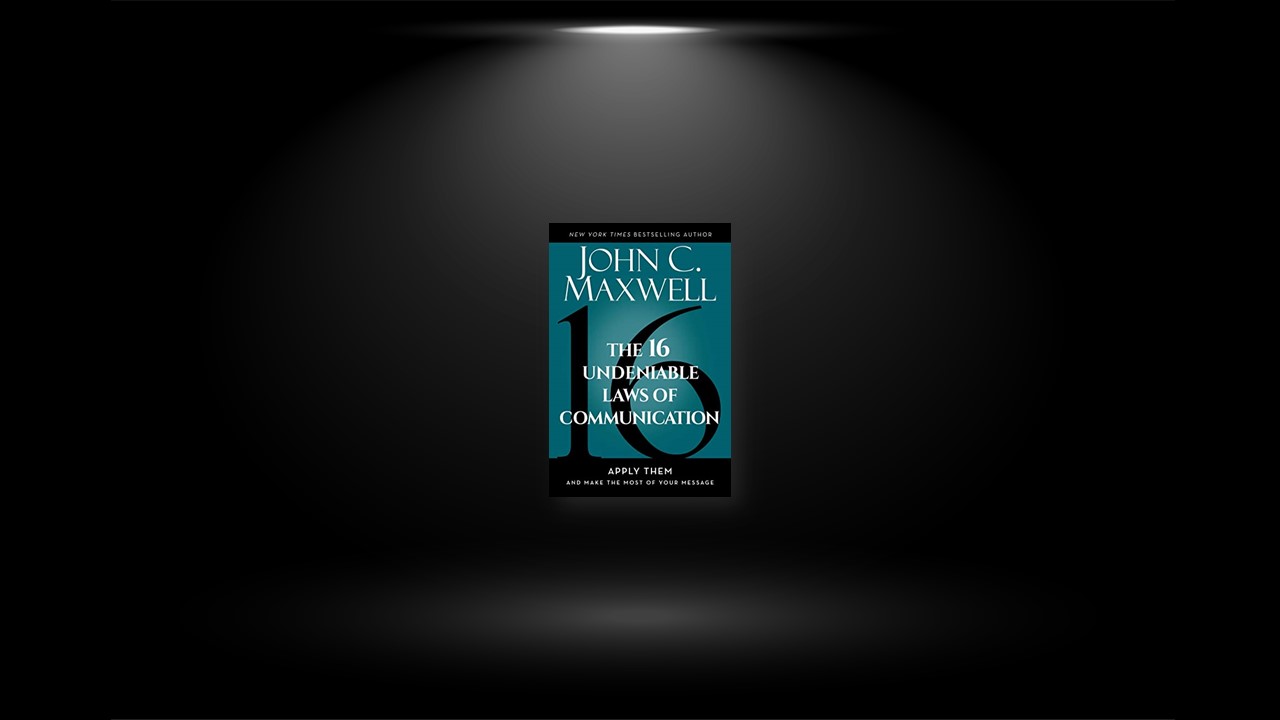The Law of Credibility
Every time you prepare to speak, ask yourself, Is this something I know? Is this something I feel? Is this something I do? Look for a yes to all three questions, and work to keep those things in alignment.
You are the message you speak. If what you’re preparing to deliver doesn’t connect with you, it won’t connect with others. It won’t breathe life into others if it doesn’t live in you. Why? Because your most effective message is the one you live. That’s the Law of Credibility.
The Law of Observation
HOW DOES ANY PERSON LEARN to communicate to an audience? Hall of Fame baseball player Yogi Berra, who became better known for his catchy sayings than he did for his catching in games with the Yankees, said, “You can observe a lot by just watching.” That is the essence of the Law of Observation. Good communicators learn from great communicators.
Good communicators are not born being able to speak. A Chinese proverb says, “To know the road ahead, ask those coming back.” If you want to become a good communicator, you need to learn from those who’ve gone ahead of you. Good communicators learn from great communicators. That’s the Law of Observation.
The Law of Conviction
WHAT DO YOU TRULY BELIEVE in? What value do you hold so dear that it’s deep in your heart and soul? What belief is so strong in you that you would be willing to live your life for it, so important that you would give your life for it? That is a conviction for you. As a communicator, you should seek to speak on subjects connected to what you deeply believe, to your strongest convictions. Why? Because the stronger you believe it, the more people feel it. That is the Law of Conviction.
The Law of Preparation
WINSTON CHURCHILL ONCE COMMENTED ON a rival by saying, “He can be described as one of those orators who, before he gets up, does not know what he is going to say; when he is speaking, does not know what he is saying; and when he has sat down, doesn’t know what he has said.”
In other words, that person was prone to winging it instead of working it. Whether through arrogance or indifference, that’s what too many speakers do. But the reality is that without proper preparation, communication doesn’t soar; it falls flat.
The Law of Collaboration
If you want to become the best communicator you can, don’t try to do it alone. Seek out others to help you. Develop a team. Ask for help. Work together. You’ll never regret it. Why? Because some of your best thinking will be done with others. That’s the Law of Collaboration.
The Law of Content
To remain relevant and relatable, learn something new every day. Keep researching and exploring. Keep asking questions. Live new experiences. Read and file content every day. Love what you do. And always update any lesson you intend to teach more than once. Your content will keep getting better only if you keep getting better. If you’re continually growing, you will never run out of content, and you will always have something worth saying.
The Law of Connecting
If you focus on others and adding value to them, while being confident in yourself and your ability to help them, you will be able to connect. You don’t have to be perfect to communicate. In fact, trying to be too perfect and polished can actually work against you. There’s something endearing about presenters and presentations that are not perfect. When the speaker is comfortable with his or her imperfections, people are drawn into the experience. So embrace your humanness.
The Law of Leverage
Any strength you possess can be leveraged for better communication, and it should be—as long as you wield it to benefit your audience members, not to manipulate them for your own benefit. As you think about your own strengths, my hope is that you discover them and lean on them. Become a good communicator. Lead with your strengths and use them often. That’s the Law of Leverage.
The Law of Anticipation
WHEN WAS THE LAST TIME you were excited to hear a speaker who wasn’t excited about his message? Can you remember? I bet you can’t. Because it has probably never happened! Why? If the speaker doesn’t have any enthusiasm about his subject, neither does his audience. And the opposite is also true: if the speaker possesses great enthusiasm, so will his audience. That’s why John says, when you can’t wait to say it, they can’t wait to hear it. That’s the Law of Anticipation.
The Law of Simplicity
Your first goal as you prepare to communicate is to make what you say crystal clear. What standard should you follow? Here’s John’s. If you can’t communicate your message to an eighth grader—who can then turn around and explain it to someone else—then it’s not simple enough.
The Law of Visual Expression
AS A COMMUNICATOR, YOU NEED to decide what you will do visually to enhance your presentations. You could rely 100 percent on your voice to carry your message, the way people did in the heyday of radio. But it’s important to note that even in radio, they used music, sound effects, and words to paint pictures. Perhaps you could use only your voice. But why would you? Show and tell is better than just tell. That’s the Law of Visual Expression.
The Law of Storytelling
Storytelling can help you in every aspect of communication. Chuck Swindoll, a brilliant communicator, said, “Stories transport us into another world. They hold our attention. They become remarkable vehicles for the communication of truth and meaningful lessons that cannot be easily forgotten.”143
Nothing makes a story go flat more quickly than a timid delivery. If you’re going to tell a story, be engaging and energetic. Become a great storyteller, because people see their own lives in stories. That’s the Law of Storytelling.
The Law of the Thermostat
PRESIDENT HARRY S. TRUMAN SAID, “NOT all readers become leaders, but all leaders must be readers.” John believes he was saying that good leaders are always growing, always learning, always reading books to improve themselves. But he believes as a leader he also knew that leaders are readers of other things as well: people, situations, trends, and opportunities.
Good communicators are similar. They are also readers. They not only read books and articles and consume information to continually learn, grow, and find ideas but also are capable of reading the room they’re speaking in. Furthermore, the best communicators can also transform the atmosphere in the room when they need to. That’s the Law of the Thermostat: communicators read the room and change the temperature.
The Law of the Change-Up
People who study communication know there is a direct correlation between unpredictability and impact. Matt Abrahams, a Stanford Graduate School of Business lecturer and coach, says, “Even just a 10 percent increase in vocal variety can have a highly significant impact on your audience’s attention to and retention of your message.” If you want people to pay attention to what you say, be less predictable. Change things up!
The more variety you bring to your communication, the more engaged your audience will be, and the more they will enjoy the journey as you take them where they need to go with your message. Audiences don’t want to just sit by passively as you talk. They want to be a part of the experience. That can happen only if you keep them with you. Never forget that sameness is the death of communication. That’s the Law of the Change-Up.
The Law of Adding Value
make it your goal to add value to people when you speak—and when you are off the stage. Do it to make them better. And don’t be surprised if you eventually receive rewards for your efforts long before you’re in your seventies. And never forget: people may forget what you say, but they never forget how you make them feel. That’s the Law of Adding Value.
The Law of Results
Good leaders want to influence people to take action, make changes, and achieve goals to make the world a better place. Good communicators want the same things. That’s one of the reasons good communication skills are foundational for effective leadership. If you can’t cast vision, show people a way forward, give them a road map, and inspire them to action, you will have a difficult time leading them.
Your motives matter. You must always lead people to action for their benefit. If you move people for only your benefit, that’s manipulation. If you move them for their benefit or mutual benefit, then you’re adding value to them and doing them a great service, which is what communication is all about. Never forget that the greatest success in communication is action. That is the Law of Results.


